
Understanding the Global Management Challenge Model
Delving into the Nuances of the Global Management Challenge Model
The Global Management Challenge (GMC) Model stands as an intricate framework designed to simulate the complexities of global management and strategic decision-making. It offers an intriguing perspective for businesses and institutions seeking to understand the dynamics of international competition. Originating in Portugal, the GMC has evolved into a prestigious management competition recognized in various countries, from the Czech Republic to the Ivory Coast.
Participants, organized into competition teams, are tasked with managing a virtual company through sophisticated simulation tools. These teams employ strategic management techniques to navigate through a series of challenges that unfold across several stages, including national and international finals. Teams must hone their decision-making skills to boost their virtual company’s share price, ultimately vying to win the global title.
The process entails comprehensive analysis and the use of detailed reports to refine strategies. This global management exercise opens a window into the real-world scenarios businesses face, offering an exquisite advantage to those who master it. The challenge also aligns with strategic objectives such as the Sustainable Development Goals (SDGs), enhancing its relevance in today's business landscape.
Incorporating continuous learning methodologies within this framework not only aids in better decision-making but also saves time by streamlining managerial processes in preparation for the final stages. This example of a management challenge underscores the vital role of lifelong learning and adaptability, essential traits for modern-day leaders to excel in a fiercely competitive global arena.
The Role of Continuous Learning in Global Management
The Importance of Continuous Learning in Global Management
In the fast-paced world of global management, continuous learning is not just a buzzword; it's a necessity. As businesses expand across borders, the ability to adapt and learn becomes crucial for success. Continuous learning helps management teams stay ahead in the competitive landscape, ensuring they are equipped with the latest tools and strategies to make informed decisions.
Global management challenges, such as those faced in the Global Management Challenge (GMC), require teams to be agile and strategic. The international competition demands that participants make quick, yet calculated decisions to navigate the complexities of a virtual company. This is where continuous learning plays a pivotal role, providing the knowledge and skills needed to tackle these challenges effectively.
Enhancing Strategic Decision-Making
Continuous learning empowers teams to enhance their strategic decision-making capabilities. By staying updated with the latest trends and insights, teams can make decisions that align with their company's goals and the broader market dynamics. This is particularly important in the GMC, where strategic management is key to winning the global competition.
Moreover, continuous learning opens a window to understanding diverse business environments, from the Czech Republic to Ivory Coast. This international exposure is invaluable, as it helps teams develop a nuanced understanding of different markets, ultimately leading to better decision-making and a higher share price in the competition.
Building an Exquisite Advantage
In the realm of global management, having an exquisite advantage can be the difference between success and failure. Continuous learning provides this advantage by equipping teams with the knowledge and skills to outmaneuver their competitors. Whether it's through strategic management tools or understanding the intricacies of the SDGs, continuous learning saves time and enhances a team's ability to win global challenges.
As companies prepare for national and international finals, continuous learning becomes a critical component of their strategy. It ensures that teams are not only prepared for the competition but are also capable of adapting to the ever-changing business landscape. This adaptability is what sets successful teams apart in the management competition.
Key Components of the Global Management Challenge Model
Identifying Core Principles in Management Simulation
At the heart of the Global Management Challenge (GMC) model is an advanced simulation that mirrors the multifaceted landscape of international business. This strategic management competition immerses participants into a virtual company environment where teams must navigate complex decision making, mirroring real-world business scenarios. Understanding these core principles is crucial for those aspiring to enhance their strategic acumen in global management.
One of the primary components of the GMC simulation is its emphasis on teamwork and competition. Teams, representing companies from countries like the Czech Republic and Portugal, must analyze detailed business reports and make strategic decisions to improve share price and outperform competitors. This competition opens a window of opportunity to refine management skills while facing international final rounds against other exceptional teams.
Another significant feature of the GMC is its focus on strategic decision making. Participants are required to balance short-term actions with long-term strategic goals, akin to the decision making processes in real-world businesses. These strategic decisions determine the success or failure of a team's virtual company. It requires an exquisite advantage in understanding market dynamics and the ability to adapt strategies in real-time.
Finally, GMC’s model leverages cutting-edge tools and manuals that enhance continuous learning. The model’s framework aligns with Sustainable Development Goals (SDGs), maximizing its relevance to modern management frameworks. For companies participating in the challenge, this alignment with SDGs not only stresses the importance of ethical business practices but also allows teams to simulate management strategies that align with global business standards.
For a deeper insight into the importance of teaching and learning in business environments, consider exploring how knowledge theories integrate within business frameworks. This understanding is vital, especially when striving to save time and efficiently manage strategic resources in competitive international scenarios such as the national final or the global management challenge.
Implementing Continuous Learning Strategies
Executing Strategies for Lifelong Learning
The Global Management Challenge presents a dynamic platform where teams engage in an intense management competition, simulating the trials and triumphs of running a virtual company. An exquisite advantage belonging to this challenge is its strong emphasis on continuous learning, an aspect vital for both personal and organizational growth. Effective implementation of continuous learning strategies within this model requires thoughtful preparation and dedication. Here are several ways to successfully embed continuous learning into the core of your strategic approach:- Utilize Advanced Tools and Resources: Teams participating in the challenge need to leverage available tools, be it management software or strategic reports. This holistic integration aids in informed decision making, ultimately enhancing team performance in both national and international finals.
- Foster a Culture of Knowledge Sharing: Embracing a culture where team members freely share insights and findings amplifies learning. During the competition, this can manifest in evaluating past performance reports to refine current strategies, helping to save time and avoid repeated errors.
- Invest in Strategic Management Training: Understanding the intricacies of strategic management is critical. Investing in such training allows teams to craft strategies that are not only effective but also aligned with the broader goals, such as sustainable development goals (SDGs).
- Practice Decision Making in Real-Time Scenarios: The competition's simulation nature opens a window to practice real-time decision making. Teams improve their proficiency by assessing situations critically, anticipating outcomes, and making decisions that could influence share prices or lead to a national final win.
- Adopt a Global Perspective: Participating countries like Portugal, the Czech Republic, and Ivory Coast introduce a diversity of perspectives and strategies, encouraging teams to consider international impacts in their decision-making processes.
Overcoming Challenges in Continuous Learning
Addressing Barriers to Continuous Learning
Continuous learning is essential in global management, as seen in the Global Management Challenge Model, wherein teams navigate complex decision making processes. However, implementing continuous learning strategies is not without challenges. Companies must address these barriers to effectively leverage the power of knowledge. One significant hurdle is the disparity between team members' skill levels. Teams often come with varied backgrounds and expertise, especially in an international setting with participants from countries like Portugal, the Czech Republic, and the Ivory Coast. Bridging this knowledge gap requires targeted training and inclusive engagement strategies, ensuring every member's contribution is optimized. Moreover, the traditional mindset of sticking to past reports and manual procedures can hinder progress. Encouraging a culture that appreciates strategic management tools and fosters innovation can be challenging, but it's essential to maintaining a competitive edge in global competition. Companies that embrace technology and cultivate a learning culture save time in decision making, providing an exquisite advantage and potentially increasing share price. Logistical concerns, such as organizing international finals and coordinating with teams across time zones, also present challenges. Companies must optimize resources efficiently, perhaps by adopting virtual company strategies to facilitate collaboration. This need for logistics coordination is crucial in management competitions like the GMC, wherein the ability to adapt quickly is often the difference between success and stagnation. Finally, aligning continuous learning objectives with business goals and global management trends can present another obstacle. Companies should integrate learning and development plans with their strategic decisions, thus opening windows for growth and enhancing their position in the management competition landscape. Overcoming these challenges requires a commitment to fostering a supportive environment that prioritizes continuous learning as a key component of international business success. By doing so, companies can better position themselves to navigate the global management challenge and win the global competition.Future Trends in Global Management and Learning
Future Directions for Advancing Global Management and Learning
The landscape of global management is experiencing rapid transformation. This evolution calls for an ongoing commitment to continuous learning in management teams worldwide. The intersection of technology, strategy management, and international competition is creating unprecedented opportunities and challenges.
One direction for the future is the increased use of digital tools which enable organizations to enhance decision making and save time. By integrating advanced analytics and strategic management platforms, businesses can more effectively navigate the complexities of global operations. Teams participating in management competitions, like the Global Management Challenge (GMC), have already started leveraging various technological tools to gain an exquisite advantage.
Moreover, the push towards achieving Sustainable Development Goals (SDG) is reshaping strategic priorities. Companies are increasingly aligning their strategies with SDG targets to bolster their competitive edge. This alignment not only supports the global objectives of the United Nations but also elevates share price potential through heightened market responsibility.
Another key trend shaping the future of global management is the rise of virtual companies and remote work environments. The aftermath of global events has opened windows to new organizational frameworks. By embracing these flexible structures, teams can benefit from a more diverse pool of talent spanning across nations such as the Czech Republic, Portugal, and the Ivory Coast without being limited by geographical barriers.
Finally, peer learning and international collaboration will remain pivotal. Management challenge competitions serve as platforms where companies from different regions—be it the national final in one country or the international final elsewhere—contribute to a rich exchange of knowledge and strategic insights.
These trends suggest a vibrant future where companies that effectively integrate continuous learning with strategic foresight will be best positioned to win globally. Maintaining a focus on strategic decision making will be crucial as businesses navigate the evolving global landscape. While reports on the short-term impacts are still to come, the longer-term implications promise to redefine how management challenges are approached.













